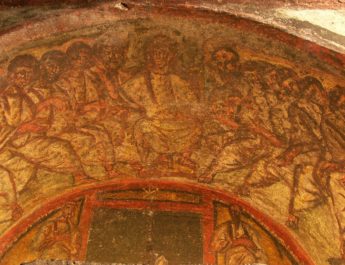Matthew 3:13-17
Baptism of the Lord A
13 Then JesusA cameB from GalileeC
A “Jesus” = Iesous. From Hebrew Yehoshua (Joshua, the Lord is salvation); {from YHVH (proper name of the God of Israel; the self-existent and eternal one); {from havah (to become) or from hayah (to come to pass, become, be)} + yasha (to deliver, defend, help, preserve, rescue; properly, to be open, wide or free, which implies being safe. So, in a causative sense, this is to free someone)}. This is Jesus or Joshua in Greek – the Lord saves or the Lord is salvation.
B “came” = paraginomai. From para (from beside, by) + ginomai (to come into being, to happen, become, be born; to emerge from one state or condition to another; this is coming into being with the sense of movement or growth). This is to arrive, appear, reach. It implies appearing publicly.
C “Galilee” = Galilaia. From Hebrew galil (cylinder, circuit, district); from galal (to roll in a literal or figurative sense, roll away, roll down, wallow, remove, trust). This is Galilee, meaning perhaps region or cylinder.
to JohnD at the Jordan,E to be baptizedF by him.
D “John” = Ioannes. Related to “Jesus” in v13. From Hebrew yochanan (Johanan); from Yehochanan (“the Lord has been gracious”); {from YHVH (see note A above) + chanan (beseech, show favor, be gracious; properly, to bend in kindness to someone with less status). This is John, meaning “the Lord has been gracious.”
E “Jordan” = Iordanes. 15x in NT. From Hebrew yarden (Jordan river, meaning “descending”); from yarad (to go down, descend; going down in a literal or figurative sense; going to the shore or a boundary, bringing down an enemy). This is the Jordan River, meaning “descending.”
F “baptized” = baptizo. From bapto (to dip or dye; to entirely cover with liquid, to stain). This is to submerge, wash, or immerse. Used specially for baptism.
14 John would have preventedG him, saying,H “I needI to be baptized by you, and do you comeJ to me?”
G “prevented” = diakoluo. 1x in NT. From dia (through, because of, across, thoroughly) + koluo (to hinder or prevent, restrain, refuse. It can be prevent, whether through words or actions); {probably from the same as kolazo (to punish, particularly to punish slaves so that they are restricted or chastised); from kolos (docked, dwarf)}. This is to forbid, prevent, or prohibit.
H “saying” = lego. This is to speak, say, name, call, command. It is generally to convey verbally.
I “need” = chreia + echo. Literally, “have need.” Chreia is from chraomai (to use, make use of, give what is needed, act in a specific way, request); related to chre (what is proper, fitting, or necessary). This is the is task, business, or affair. It can also be need, want, or destitution. Echo is have, hold, possess.
J “come” = erchomai. This is to come or go.
15 But Jesus answered him, “Let it beK so now, for it is properL for us in this way to fulfillM
K “let it be” = aphiemi. From apo (from, away from) + hiemi (to send). This is send away, release, permit, forgive, allow to depart, discharge, or send forth.
L “is proper” = prepo + eimi. Prepo is 7x in NT. This is fitting, suitable, conspicuous, proper. Eimi is to be, exist.
M “fulfill” = pleroo. From pleres (to be full, complete, abounding in, occupied with). This is to fill, make full or complete. Properly, this is filling something up to the maximum extent that it can be filled – an appropriate amount for its individual capacity. So, this is used figuratively for furnish, influence, satisfy, finish, preach, perfect, and fulfill.
allN righteousness.”O Then he consented.P
N “all” = pas. This is all or every.
O “righteousness” = dikaiosune. From dikaios (correct, righteous – implies innocent; this is that which conforms to God’s notion of justice, uprightness); from dike (the principle of justice; that which is right in a way that is very clear; a decision or the execution of that decision; originally, this word was for custom or usage; evolved to include the process of law, judicial hearing, execution of sentence, penalty, and even vengeance; more commonly, it refers to what is right); may be from deiknumi (to show, point out, exhibit; figurative for teach, demonstrate, make known). This is judicial or divine approval of character or action. This is righteousness, justice, justness, divine righteousness.
P “consented” = aphiemi. Same as “let it be” in v13. See note K above.
16 And when Jesus had been baptized, just asQ he came upR from the water,S
Q “just as” = eutheos. From euthus (immediately, upright, straight and not crooked); {perhaps from eu (good, well, well done, rightly) + tithemi (to place, lay, set, establish)}. This is directly, soon, at once.
R “came up” = anabaino. From ana (up, back, among, again, anew) + the same as basis (step, hence foot; a pace); {from baino (to walk, to go)}. This is to come up in a literal or figurative sense – ascent, rise, climb, enter.
S “water” = hudor. Perhaps from huetos (rain); from huo (to rain). This is water literal or figurative. It is one of the roots that “hydrogen” and “hydroelectric” come from.
suddenlyT the heavensU were openedV to him and he sawW
T “suddenly” = idou. From eido (to be aware, see, know, remember, appreciate). This is see! Lo! Behold! Look! Used to express surprise and or draw attention to the statement.
U “heavens” = ouranos. May be related to oros (mountain, hill); probably related to airo (raise, take up, lift, remove). This is the air, the sky, the atmosphere, and heaven. It is the sky that is visible and the spiritual heaven where God dwells. Heaven implies happiness, power, and eternity.
V “opened” = anoigo. From ana (up, back, again, among, between, anew) + oigo (to open). This is to open in literal or figurative sense.
W “saw” = horao. To see, perceive, attend to, look upon, experience. Properly, to stare at and so implying clear discernment. This, by extension, would indicate attending to what was seen and learned. This is to see, often with a metaphorical sense. Can include inward spiritual seeing.
God’sX SpiritY descendingZ like a doveAA and alightingBB on him.
X “God’s” = Theos. From Proto-Indo-European origins, meaning do, put, place. This is God or a god in general.
Y “Spirit” = Pneuma. From pneo (to blow, breathe, breathe hard). This is wind, breath, or ghost. A breeze or a blast or air, a breath. Figuratively used for a spirit, the human soul or part of us that is rational. It is also used supernaturally for angels, demons, God, and the Holy Spirit. This is where pneumonia comes from.
Z “descending” = katabaino. Related to “came up” in v16. From kata (down, against, throughout, among) + baino (see note R above). This is to come down whether from the sky to the ground or from higher ground to lower. It can be used in a literal or figurative sense.
AA “dove” = peristera. 10x in NT. This is dove or pigeon.
BB “alighting” = erchomai. Same as “come” in v14. See note J above.
17 AndCC a voiceDD from the heavens said, “This is my Son,EE the Beloved,FF with whom I am well pleased.”GG
CC {untranslated} = idou. Same as “suddenly” in v16. See note T above.
DD “voice” = phone. Probably from phemi (to declare, say, use contrasts in speaking to shed light on one point of view); {from phao (to shine) or phaino (to bring light, cause to appear, shine, become visible or clear). This is a voice, sound, tone or noise. It can also be a language or dialect.
EE “Son” = huios. This is son, descendant – a son whether natural born or adopted. It can be used figuratively for other forms of kinship.
FF “Beloved” = agapetos. From agape (love, goodwill, benevolence; God’s divine love); from agapao (to love, take pleasure in, esteem; to prefer). This is Beloved or very dear one. It is a title for the Messiah, but also for Christians. Properly, this is one who personally experiences God’s love.
GG “am well pleased” = eudokeo. Related to “just as” in v16. From eu (see note Q above) + dokeo (to have an opinion, seem, appear, suppose; a personal judgment; to think); from dokos (opinion). This is to think well of, to be pleased or resolved. Properly, this is what someone finds good or acceptable – approving of some action or generally thinking well of.
Image credit: “Baptism of Jesus” by Liz Valente, Brazil, 2021.




